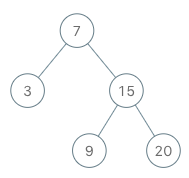LeetCode in TypeScript
173. Binary Search Tree Iterator
Medium
Implement the BSTIterator class that represents an iterator over the in-order traversal of a binary search tree (BST):
BSTIterator(TreeNode root)Initializes an object of theBSTIteratorclass. Therootof the BST is given as part of the constructor. The pointer should be initialized to a non-existent number smaller than any element in the BST.boolean hasNext()Returnstrueif there exists a number in the traversal to the right of the pointer, otherwise returnsfalse.int next()Moves the pointer to the right, then returns the number at the pointer.
Notice that by initializing the pointer to a non-existent smallest number, the first call to next() will return the smallest element in the BST.
You may assume that next() calls will always be valid. That is, there will be at least a next number in the in-order traversal when next() is called.
Example 1:

Input [“BSTIterator”, “next”, “next”, “hasNext”, “next”, “hasNext”, “next”, “hasNext”, “next”, “hasNext”] [[[7, 3, 15, null, null, 9, 20]], [], [], [], [], [], [], [], [], []]
Output: [null, 3, 7, true, 9, true, 15, true, 20, false]
Explanation:
BSTIterator bSTIterator = new BSTIterator([7, 3, 15, null, null, 9, 20]);
bSTIterator.next(); // return 3
bSTIterator.next(); // return 7
bSTIterator.hasNext(); // return True
bSTIterator.next(); // return 9
bSTIterator.hasNext(); // return True
bSTIterator.next(); // return 15
bSTIterator.hasNext(); // return True
bSTIterator.next(); // return 20
bSTIterator.hasNext(); // return False
Constraints:
- The number of nodes in the tree is in the range
[1, 105]. 0 <= Node.val <= 106- At most
105calls will be made tohasNext, andnext.
Follow up:
- Could you implement
next()andhasNext()to run in averageO(1)time and useO(h)memory, wherehis the height of the tree?
Solution
import { TreeNode } from '../../com_github_leetcode/treenode'
/**
* Definition for a binary tree node.
* class TreeNode {
* val: number
* left: TreeNode | null
* right: TreeNode | null
* constructor(val?: number, left?: TreeNode | null, right?: TreeNode | null) {
* this.val = (val===undefined ? 0 : val)
* this.left = (left===undefined ? null : left)
* this.right = (right===undefined ? null : right)
* }
* }
*/
class BSTIterator {
private node: TreeNode | null
constructor(root: TreeNode | null) {
this.node = root
}
next(): number {
let res = -1
while (this.node !== null) {
if (this.node.left !== null) {
let rightMost = this.node.left
while (rightMost.right !== null && rightMost.right !== this.node) {
rightMost = rightMost.right
}
if (rightMost.right === null) {
rightMost.right = this.node
this.node = this.node.left
} else {
rightMost.right = null
res = this.node.val
this.node = this.node.right
return res
}
} else {
res = this.node.val
this.node = this.node.right
return res
}
}
return res
}
hasNext(): boolean {
return this.node !== null
}
}
/**
* Your BSTIterator object will be instantiated and called as such:
* var obj = new BSTIterator(root)
* var param_1 = obj.next()
* var param_2 = obj.hasNext()
*/
export { BSTIterator }

